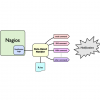Search Exchange
Search All Sites
Nagios Live Webinars
Let our experts show you how Nagios can help your organization.Login
Directory Tree
Rule-Based Notifier Featured
Current Version
1.1
Last Release Date
2012-03-01
Compatible With
- Nagios 3.x
- Nagios 4.x
Owner
License
GPL
Hits
104640
Files:
| File | Description |
|---|---|
| notifier-1.0.tar.gz | v1.0 |
| notifier-1.1.tar.gz | v1.1 |
Meet The New Nagios Core Services Platform
Built on over 25 years of monitoring experience, the Nagios Core Services Platform provides insightful monitoring dashboards, time-saving monitoring wizards, and unmatched ease of use. Use it for free indefinitely.
Monitoring Made Magically Better
- Nagios Core on Overdrive
- Powerful Monitoring Dashboards
- Time-Saving Configuration Wizards
- Open Source Powered Monitoring On Steroids
- And So Much More!
Current Version: v1.1 (03/01/2012)
The included simple Perl script is a rule-based notification addon for Nagios.
Nagios has its own notification logic which decides whether a notification
for an alert should be sent. If this script is defined as the notification
commands, further conditions can be defined by admins to control whether a
notification should be "actually" sent.
By using this script, Nagios admins can decide:
WHO should (or not) be notified,
notification for WHICH hosts/services should (or not) be controlled,
on WHAT states should (or not) be concerned,
at WHEN a notification should (or not) be sent,
HOW to send a notification,
and so on.
All these features are implemented by defining some "rules" which will
be matched by this script while Nagios hand off a notification to it.
Rules are defined in a plain text config file (see inside), no database is
needed.
Changes of v1.1
------------------
* Support partial wildcard in some fields of rules, e.g. "abc*" is a group of all object IDs beginning with "abc"
* Group matching has a priority between exactly matching and wildcard matching (*)
* Admins can supply an extra condition, by matching a Nagios macro with some values, in each rule
* Some bugs fixed
Nagios has its own notification logic which decides whether a notification
for an alert should be sent. If this script is defined as the notification
commands, further conditions can be defined by admins to control whether a
notification should be "actually" sent.
By using this script, Nagios admins can decide:
WHO should (or not) be notified,
notification for WHICH hosts/services should (or not) be controlled,
on WHAT states should (or not) be concerned,
at WHEN a notification should (or not) be sent,
HOW to send a notification,
and so on.
All these features are implemented by defining some "rules" which will
be matched by this script while Nagios hand off a notification to it.
Rules are defined in a plain text config file (see inside), no database is
needed.
Changes of v1.1
------------------
* Support partial wildcard in some fields of rules, e.g. "abc*" is a group of all object IDs beginning with "abc"
* Group matching has a priority between exactly matching and wildcard matching (*)
* Admins can supply an extra condition, by matching a Nagios macro with some values, in each rule
* Some bugs fixed
Reviews (1)
bydjzecevic, September 20, 2011
I just tried it and I love it. Easy to use and configure.


 New Listings
New Listings
